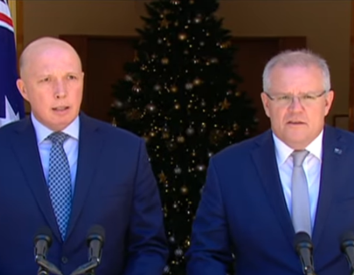With Australia raising its hand to be part of joint naval exercises in the South China Sea, its departure from the G7 in Cornwall continues the "down-under" tradition of following U.S. foreign policy.
Although the beat of war drums is currently more muffled, anti-China rhetoric still echoes down the chilly halls of Federal Parliament as the winter sitting takes place.
In 2003, without parliamentary oversight, Australia followed the U.S. into Iraq. The given purpose was to initiate action against what then-U.S. President George W. Bush called the "axis of evil": initially Iraq, Iran and North Korea, and later expanded to Cuba, Libya and Syria. This axis was in fact quite shaky.
One consequence of that unconscionable invasion was the toll on young Australian defence personnel, and others such as journalists, in terms of moral injury and stress. The compulsive loop of the Federal Government supporting U.S. wars with no direct relation to Australia – Korea, Vietnam, Iraq, Afghanistan – and those wars damaging Australian lives, has played non-stop since its entry into the ANZUS agreement.
Some, especially weapons trade profiteers and their political lackeys, want conflict with China to continue that unhappy pattern.
It is imperative that the now muted "drums of war" are silenced once and for all.
Readers are therefore urged to respond to the People’s Inquiry for a Peaceful and Independent Australia being conducted by the Independent Peaceful Australia Network (IPAN).
The inquiry’s purpose is to examine the impact of involvement in U.S.-led wars and the U.S.-Australia Alliance on everyday Australians. The current obsession with China and the inexplicable desire to face off with the world’s greatest military power is arguably a result of our alliance with the U.S.
The Inquiry Chairperson is Kellie Tranter, one of Australia’s leading authorities on the growing influence of weapons manufacturers on government policy in Australia.
There are also several panels addressing the various ways in which involvement in U.S.-led wars impacts our lives.
In addition, an IPAN website questionnaire can be completed in a very short time. Both submission and questionnaire suggestions will inform the Inquiry’s final report. Possible submission talking points are raised below.
The first is military action as a last resort only. In their highly theatrical and confected "confrontation" with China, the current Government appears adamant not to resolve differences through peaceful diplomatic discussion.
Rather, Australia insists upon signalling armed conflict as inevitable. China has indeed been reluctant to discuss recent trade tensions. After Foreign Minister Marise Payne returned from the United States, called upon China to allow an independent inquiry into COVID in that country, did Australia really think that China would let this public admonition pass without penalty?
A second concern relates to post-conflict planning. Consider that the worst occurs and that military engagement with China eventuated.
What do the "drum beaters" say about the consequences of such an event? Nothing. Absolutely nothing.
Their sole focus is creating façades of inevitability regarding China as a future "threat," consequences be damned. A true cynic might note that after Iraq it was those associated with the people who pushed for the war who benefited from reconstruction contracts.
Does such arrant self-interest continue to operate?
The third point involves what the Chilcot Report – which examined United Kingdom military entry into Iraq – called the ‘flawed nature’ of intelligence informing the decision to invade. John Menadue has noted that while current advice regarding China as a threat ‘stemmed primarily from the Australian intelligence agencies bolstered by Defence’, we could ‘safely assume that most of that came from US sources which swamp any indigenous Australian sources'.
Menadue references a Kim Beasley comment noting:
‘... how much [Australia] depended on intelligence on our region from Pine Gap sources.’
It is possible that even the exemplar U.S. intelligence installation, Pine Gap, might produce the sort of "flawed" information referred to in the Chilcot Report.
Although Chilcot’s observations were made some time ago, they remain relevant today. In fact, with the exponential growth in fake news and the accelerated speed at which material circulates through social media platforms, the likelihood of misleading intelligence being the basis for life and death security decisions is perhaps more of a threat now than the time of the Iraq War.
Such misleading intelligence arguably presents a greater risk than any associated with China.
Submissions can be made through the IPAN Inquiry website via the online form.
IPAN is a network of organisations around Australia aiming to build public dialogue and pressure for change to a truly independent foreign policy for Australia — one in which our government plays a positive role in solving international conflicts peacefully.
Related Articles
- Asia must follow Japan in fighting against Chinese regional aggression
- The G7, NATO and the demonising of China
- Australia is in denial over one-way relationship with U.S.
- Australia's U.S. alliance is leading us down a path of war against China
- Military a winner in Biden's Budget
 This work is licensed under a Creative Commons Attribution-NonCommercial-NoDerivs 3.0 Australia License
This work is licensed under a Creative Commons Attribution-NonCommercial-NoDerivs 3.0 Australia License
Support independent journalism Subscribe to IA.












